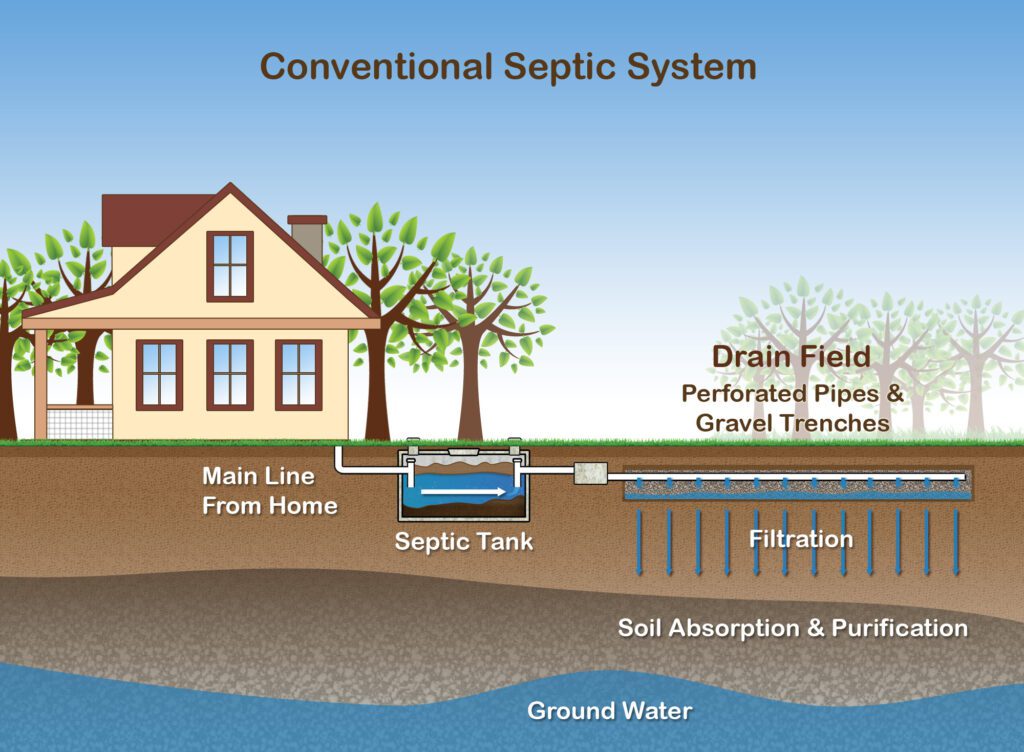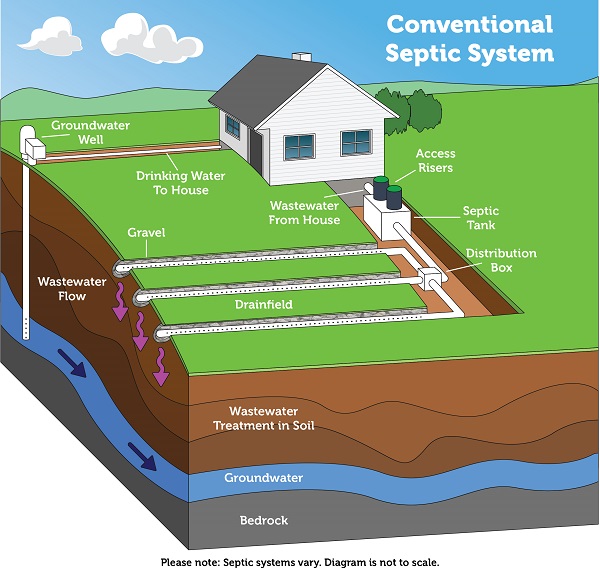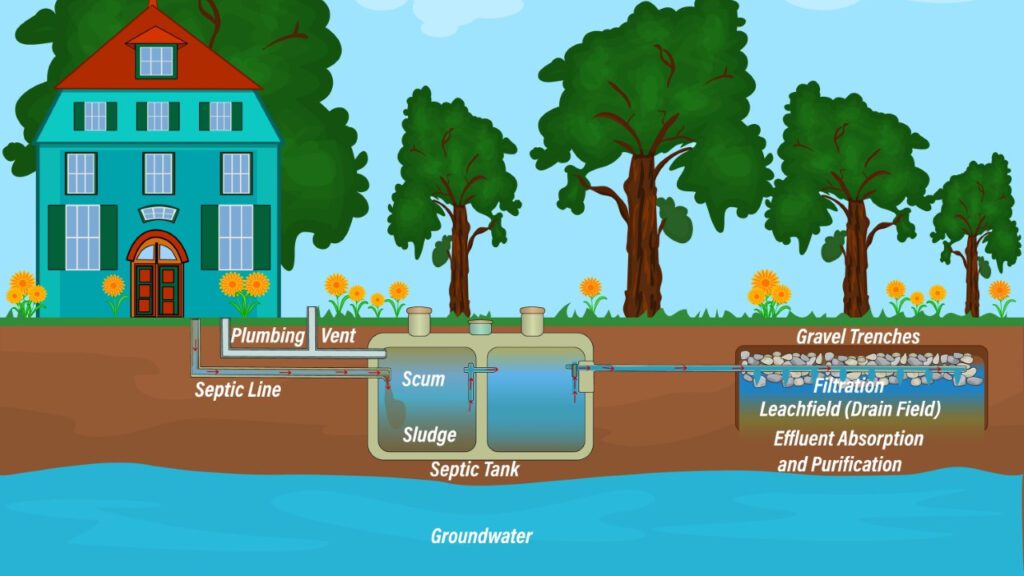In the article “Can I Use Drain Cleaner With A Septic Tank? Understanding The Impact On Your System,” you’ll learn about the potential consequences of using drain cleaner in a septic tank. While drain cleaner may seem like a quick and convenient solution for clogged drains, its impact on a septic system can be detrimental. Discover why these harsh chemicals can disrupt the delicate balance of bacteria in your septic tank and lead to costly repairs. By understanding the potential risks, you can make informed decisions about maintaining the health of your septic system.
Understanding the Septic Tank System
What is a septic tank?
A septic tank is an underground wastewater treatment system that is commonly used in areas where there is no access to a centralized sewage system. It is usually made of concrete or plastic and is designed to collect and treat household wastewater from toilets, sinks, showers, and laundry.
How does a septic tank work?
A septic tank works by allowing solid waste to settle at the bottom of the tank while oils, grease, and scum float to the surface. Bacteria inside the tank break down the solid waste, turning it into sludge. The treated wastewater, also known as effluent, is then released into a drain field where it is further treated by the soil.
Components of a septic tank system
A typical septic tank system consists of a septic tank, a distribution box, and a drain field. The septic tank is the main component and acts as a holding tank for the wastewater. The distribution box evenly distributes the effluent to the drain field, which is a series of perforated pipes buried in the soil. The drain field then filters and treats the effluent before it reenters the groundwater.
Types of Drain Cleaners
Chemical drain cleaners
Chemical drain cleaners are widely available and often used to clear clogs in drains and pipes. They work by dissolving or breaking down the blockage, allowing water to flow freely. These cleaners often contain strong chemicals such as sodium hydroxide or sulfuric acid.
Natural drain cleaners
Natural drain cleaners are a safer and more environmentally friendly alternative to chemical drain cleaners. These cleaners use natural ingredients such as baking soda, vinegar, or lemon juice to break down clogs and remove buildup in pipes.
Enzyme-based drain cleaners
Enzyme-based drain cleaners are another type of drain cleaner that utilizes natural enzymes to break down organic materials in pipes and drains. These cleaners can be effective in removing clogs and preventing future buildup without the use of harsh chemicals.

Effects of Chemical Drain Cleaners on Septic Tanks
Chemical composition of drain cleaners
Chemical drain cleaners often contain caustic substances such as sodium hydroxide or sulfuric acid. These chemicals can be highly corrosive and can cause damage to the pipes and components of a septic tank system.
Potential harm to septic tank bacteria
Septic tank systems rely on a delicate balance of bacteria to break down solid waste. The strong chemicals in drain cleaners can kill the beneficial bacteria in the septic tank, disrupting the natural process of waste decomposition.
Impact on the breakdown of solids
The corrosive nature of chemical drain cleaners can affect the breakdown of solid waste in the septic tank. When the bacteria responsible for breaking down waste are killed or inhibited, the sludge can accumulate and cause blockages within the tank.
Corrosion of septic tank components
Chemical drain cleaners can also cause damage to the septic tank itself, as well as the distribution box and drain field. The corrosive nature of these cleaners can deteriorate the materials, leading to leaks and potential system failure.
Safety Concerns
Health hazards of chemical drain cleaners
Chemical drain cleaners can pose serious health hazards, especially if not used properly. These cleaners can cause chemical burns to the skin and eyes and should be handled with caution. Inhalation of the fumes can also lead to respiratory problems.
Exposure risks for septic tank maintenance professionals
Septic tank maintenance professionals who come into contact with chemical drain cleaners may be at risk of exposure to hazardous chemicals. Proper protective gear and safety protocols should be followed to minimize the risk of harm.
Considerations for households with children and pets
Households with children and pets should exercise caution when using chemical drain cleaners. The strong chemicals can pose a poisoning risk if ingested or if there is contact with the skin. It is advisable to keep these cleaners out of reach and consider safer alternatives.

Alternatives to Chemical Drain Cleaners
Natural drain cleaning methods
As an alternative to chemical drain cleaners, natural methods can be used to unclog drains and prevent buildup. Pouring boiling water, baking soda, and vinegar down the drain can help break down debris and clear minor blockages.
DIY drain cleaning solutions
DIY drain cleaning solutions can also be effective in maintaining a healthy septic tank system. Mixtures of baking soda and salt or baking soda and lemon juice can be poured down the drain to help remove buildup and keep the pipes flowing smoothly.
Professional drain cleaning services
For more severe clogs or issues with the septic system, it is advisable to seek professional drain cleaning services. These professionals have the expertise and equipment to safely and effectively clear clogs without causing harm to the septic tank system.
Maintaining a Healthy Septic Tank System
Regular septic tank pumping
Regular septic tank pumping is crucial for maintaining a healthy system. The frequency of pumping depends on the size of the tank and the number of occupants in the household. It is generally recommended to have the tank pumped every 3 to 5 years.
Proper waste disposal practices
Proper waste disposal practices play a significant role in the health of a septic tank system. Avoid flushing non-biodegradable items such as wipes, paper towels, or feminine hygiene products down the toilet. Additionally, minimizing the use of harsh chemicals in household cleaning products can help preserve the balance of bacteria in the septic tank.
Avoiding items that can harm the septic system
Certain items should be avoided to prevent damage to the septic tank system. This includes pouring grease, oils, or chemicals down the drains, as well as using excessive amounts of water, which can overload the system.

Signs of Septic Tank Issues
Foul odor
One of the most noticeable signs of septic tank issues is a foul odor. If you detect a sewage smell in your yard or around drains, it may indicate a problem with the septic system.
Slow drains or backups
Slow drains or frequent backups can be a sign that the septic tank is not functioning properly. If water is not draining as it should, it may be time to have the septic system inspected.
Pooling water or lush vegetation
Pooling water or areas of lush vegetation in the drain field can indicate a problem with the septic tank system. This may suggest that the drain field is not adequately processing the effluent.
Gurgling sounds
Gurgling sounds coming from drains or toilets can be a sign of a blockage in the septic system. This could be caused by solid waste buildup or a clogged pipe.
High nitrate levels in well water
If your home has a well, high nitrate levels in the water can be an indicator of a failing septic system. Nitrates from wastewater can contaminate the groundwater and pose a health risk.
Consulting with Professionals
Septic tank specialists
Consulting with septic tank specialists is essential when experiencing issues with your septic system. These professionals can assess the situation, perform necessary repairs, and provide guidance on proper maintenance.
Plumbers
Plumbers can also be valuable resources when it comes to septic tank issues. They can identify plumbing-related problems and offer solutions to prevent further damage to the septic system.
Environmental health departments
Local environmental health departments can provide guidance on septic system regulations, permits, and inspections. They can also provide information on septic tank maintenance and help to resolve any compliance concerns.

Septic Tank-Friendly Drain Cleaners
Enzyme-based drain cleaners
Enzyme-based drain cleaners are a septic tank-friendly option. These cleaners work by utilizing natural enzymes to break down organic materials, promoting a healthy balance of bacteria in the septic tank system.
Bacterial drain cleaners
Bacterial drain cleaners contain live bacteria that feed on organic waste, helping to maintain a healthy septic tank system. These cleaners can effectively break down clogs and prevent further issues.
Homemade drain cleaning solutions
Homemade drain cleaning solutions using natural ingredients such as baking soda, vinegar, and lemon juice can be septic tank-friendly alternatives. These solutions can help remove minor clogs and keep drains flowing smoothly.
Conclusion
Understanding the impact of drain cleaners on your septic tank system is crucial for maintaining its health and functionality. Chemical drain cleaners can have detrimental effects on the bacteria and components of the septic system, leading to potential damage and costly repairs. It is important to consider safer alternatives such as natural drain cleaners or seek professional drain cleaning services when needed. Regular maintenance, proper waste disposal practices, and early detection of septic tank issues are key to ensuring the longevity and efficiency of your septic tank system. By taking these steps, you can promote a healthy and sustainable wastewater treatment system for your home.

